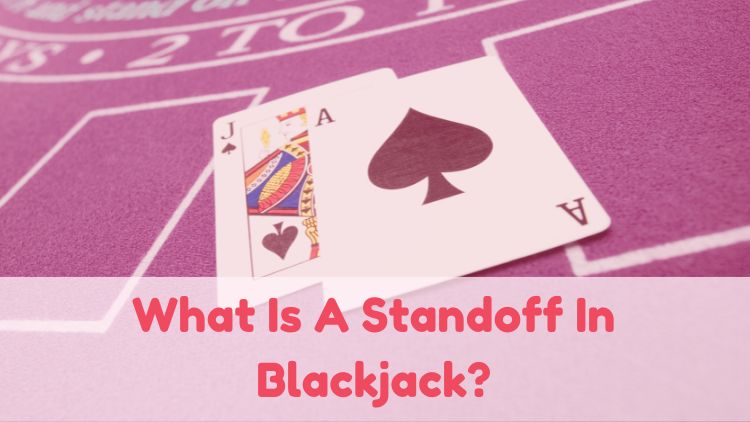
Blackjack is a popular card game found in nearly every casino. It's known for its straightforward rules and exciting gameplay.
In blackjack, players compete against the dealer to get a hand as close to 21 as possible without going over. But what happens if both the player and the dealer end up with the same total?
This scenario is called a standoff or a push. It means neither the player nor the dealer wins. Your original bet is returned to you, and the round is a tie. Understanding a standoff is essential for anyone looking to play blackjack.
In this article, we'll explain what a standoff is, provide examples, and discuss what to do when it happens. Let's dive into the details.
What Does Standoff Mean In Blackjack?
A standoff in blackjack occurs when the player's hand and the dealer's hand have the same total value at the end of a round. This situation is also known as a push.
In a standoff, no one wins, and no one loses. The player's original bet is returned, and the game moves on to the next round.
For example, if both the player and the dealer have a hand total of 18, it's a standoff. The player gets their bet back, and no additional chips are won or lost.
Standoffs are fairly common in blackjack. They can happen naturally when both the player and dealer draw the same total from the deck. It's important to remember that a standoff is different from a win or a loss. Unlike winning, you don't receive any extra money. And unlike losing, you don't lose your bet.
Understanding what a standoff means helps keep your expectations clear when playing blackjack.
What Happens When Two People Tie In Blackjack?
When two people tie in blackjack, it's referred to as a standoff or push. In this situation, the player's hand and the dealer's hand have exactly the same total value.
When a tie occurs, neither the player nor the dealer wins. Instead, the player's original bet is returned, and the round is considered a draw. No additional money is won or lost.
For instance, if both the player and dealer end up with a total of 19, it's a tie. The player gets back the amount they bet, and the game resets for the next round.
However, if two players end up with the same total, it doesn't impact the game in any way. In blackjack, each player is playing individually against the dealer, so the outcome of other players' hands has no impact on your blackjack game. It only matters what you and the dealer have.
It's important to understand that a tie does not affect the player's overall playing chips, but it also doesn't add to them. Ties are simply neutral outcomes where the game moves forward without any financial change for the player.
In summary, a tie means you keep your original bet, and the game continues as usual. This understanding is vital for managing your bets and expectations while playing blackjack.
Does a Tie Go To the Dealer in Blackjack?
In blackjack, a tie does not go to the dealer.
If both the player and the dealer end up with the same hand total, it is a standoff or push. This means that neither the player nor the dealer wins the round. The player's original bet is simply returned, and the game proceeds to the next round.
Unlike other casino games where a tie might favour the house, blackjack is unique. The rules are clear: a standoff does not result in a loss for the player.
For instance, if you bet £10 and both you and the dealer get a hand totalling 20, you don't lose your £10. Instead, you get to keep your £10, but you receive no extra winnings, and you can use it to play the next hand if you choose.
Understanding that a tie does not benefit the dealer helps you manage your expectations and strategy while playing. This knowledge can help ensure a smoother and more enjoyable experience at the blackjack table.
Remember to always gamble responsibly by only betting money you are comfortable losing and sticking to a budget.
